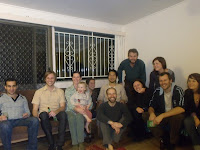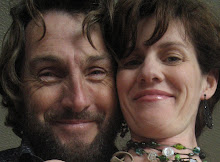Last night, I kicked off the first of many events for the campaign which I've called "Eat Your Greens". A small group of interested voters in my electorate of Griffith offered to host their friends to provide an opportunity to talk 'politics'. Along with religion, politics is a subject that is normally taboo at dinner parties, but we're turning the tables and getting engaged again.
 My own journey of living a more environmentally sustainable life came about because of a number of one-on-one conversations with a few key people. It is my strong belief that that the greatest catalyst for change is through dialogue. Imagine if the leaders of the USA and the Taliban actually sat together over some good food and talked about things? OK, I'm probably being slightly hopeful there, but change does happen through talking about things, and in this age of twittering and FBing and texting, an opportunity to meet face to face and have those deep and meaningful conversations are simply priceless.
My own journey of living a more environmentally sustainable life came about because of a number of one-on-one conversations with a few key people. It is my strong belief that that the greatest catalyst for change is through dialogue. Imagine if the leaders of the USA and the Taliban actually sat together over some good food and talked about things? OK, I'm probably being slightly hopeful there, but change does happen through talking about things, and in this age of twittering and FBing and texting, an opportunity to meet face to face and have those deep and meaningful conversations are simply priceless. It might all sound a bit old-fashioned, but that’s kind of the way I like it. As a people-powered party, we don’t have the deep corporate-lined pockets of Labor and the LNP to spread our message through multi-million dollar advertising campaigns. We need to do politics a different way: neighbour-to-neighbour, friend-to-friend.... and over delicious food!
Even if you’d prefer to do a lunch, breakfast or afternoon tea instead – it’s all great. All you need to do is invite between 5 to 15 people to have a conversation, whether at your favourite pub, cafe or inside your home, and I'll be more than happy to come along to talk about the issues that matter to you in the lead up to the election.
- Tuesday, 27 July - Highgate Hill - Dinner
- Wednesday, 4 August - Morningside - Afternoon Tea
- Wednesday, 18 August - Cannon Hill - Afternoon Tea



